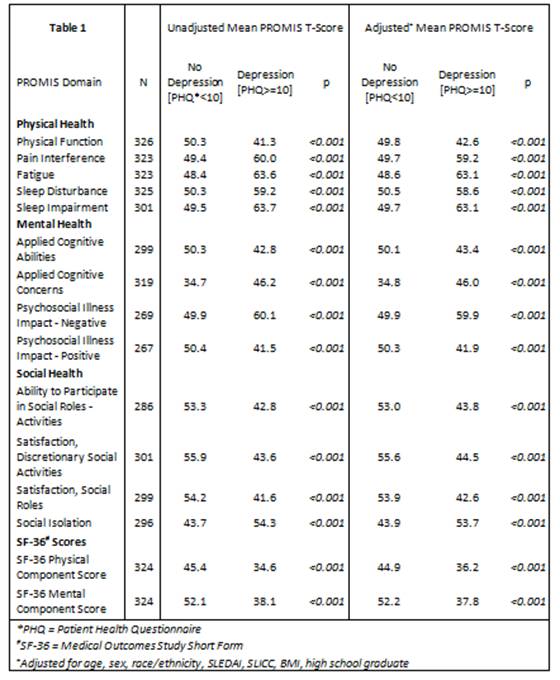Session Information
Date: Monday, October 22, 2018
Title: Patient Outcomes, Preferences, and Attitudes Poster I: Patient-Reported Outcomes
Session Type: ACR Poster Session B
Session Time: 9:00AM-11:00AM
Background/Purpose: Health-related quality of life (HRQoL) is reduced in SLE. Depression is a possible contributor to reduced HRQoL. The relationship between major depression and HRQoL measured using NIH’s Patient Reported Outcomes Measurement Information System (PROMIS) has not been well characterized.
Methods: Data were obtained from the California Lupus Epidemiology Study (CLUES), a cohort of adult patients in San Francisco County with physician-confirmed SLE. Subjects attended a research clinic encounter with a physician and completed a structured interview with a research assistant. The primary outcomes were T-scores on 13 PROMIS short forms (Table 1), scaled to a population mean of 50 and SD of 10. The primary predictor variable was major depression, defined as a score of 10 or greater on the Patient Health Questionnaire (PHQ-8) depression scale. Mean T-scores in depressed and non-depressed patients were compared using linear regression models with and without adjustment for age, sex, race/ethnicity, disease activity measured by the SLEDAI, BMI, and education less than high school graduate.
Results: 296 of 326 study participants met at least 4 of 11 ACR criteria for SLE, 20 met 3 ACR criteria and had SLE confirmed by a rheumatologist, and 10 had a diagnosis of lupus nephritis. Approximately 89% were female, 29% white, 23% Hispanic, 10% black, and 36% Asian. A quarter had a PHQ-8 score consistent with major depression. Depression was independently associated with worse mean T-scores on all 13 PROMIS short form domains tested (p<0.001, Table 1). In multivariable analyses, depressed subjects scored more than 10 points (1 SD) worse on Fatigue, Sleep Impairment, Negative Psychosocial Impact of Illness, Applied Cognitive Concerns, Satisfaction in Discretionary Social Activities, and Satisfaction in Social Roles. Depressed patients also had worse scores on the Medical Outcomes Study Short Form (SF-36) Physical Component Summary and Mental Component Summary (p<0.001).
Conclusion: Major depression was independently associated with substantially worse patient-reported outcomes on every tested PROMIS domain of physical, mental, and social health, as well as on SF-36 mental and physical subcomponents, even after adjusting for disease activity and sociodemographic characteristics. Assessment of comorbid major depression may be an important part of interpreting and targeting HRQoL in SLE patients when using PROMIS.
To cite this abstract in AMA style:
Dietz B, Katz P, Dall'Era M, Murphy L, Lanata C, Trupin L, Yazdany J. Depression and the Patient Reported Outcomes Measurement Information System in Systemic Lupus Erythematosus [abstract]. Arthritis Rheumatol. 2018; 70 (suppl 9). https://acrabstracts.org/abstract/depression-and-the-patient-reported-outcomes-measurement-information-system-in-systemic-lupus-erythematosus/. Accessed .« Back to 2018 ACR/ARHP Annual Meeting
ACR Meeting Abstracts - https://acrabstracts.org/abstract/depression-and-the-patient-reported-outcomes-measurement-information-system-in-systemic-lupus-erythematosus/

